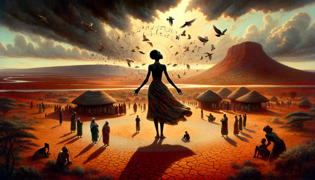Introduction
Dawn crept over the village of Thuka like a sigh escaping parched lips. The earth lay split and dusty, each fissure a riverbank of sorrow. A scorched wind sparked dance across the brittle grasses, rattling bead necklaces like a dry rain, whispering secrets of a sky that had forgotten how to weep. Even the goats huddled beneath thorny bushed, their chilly breaths swirling in pale puffs, as if chiding the fierce sun for its cruelty. Haraka haraka haina baraka echoed through empty huts—a reminder that haste breeds no blessing. There, between twisted acacia trunks, stood Nyaguthi, her small frame firm as a knobby root, dark eyes shining with an ember of hope. She carried an ancient drum carved by her grandmother’s grandmother—its hide taut as the urgent pulse of the land. Every fiber seemed alive, humming with ancestral longing. As clouds gathered on the horizon like a tattered quilt, Nyaguthi pressed her palms to the drumskin. Her heart thrummed in sync with distant thunder, a slow heartbeat echoing the rhythm of earth and sky. In that charged silence, she remembered her grandmother’s words: “Mzee wa mvua ana simba ya malaika”—the rain elder wields the power of angels. That single truth burned brighter than the sun overhead. Pole pole ndiyo mwendo, she whispered, drawing in a breath heavy with dust and determination. The wind stilled. The world seemed to hold its breath, waiting for the first note to slip free and crack open the heavens.
The Parched Village
Paragraph 1:
Every dawn, Nyaguthi paced the rim of the village like a restless termite, scanning the horizon for signs of mercy. The maize stalks drooped in mournful arches, resembling bowed heads at a funeral. Heat wavered in hazy pulses, tinting distant hills a muffled blue. Her tongue stuck like a discarded shell to the roof of her mouth. She longed for the tang of rain on parched clay, the electric sting of droplets dancing on sunburned skin. In her dreams, she heard distant water rushing like a playful child through riverbeds now sealed by drought. Palm leaves rasped overhead, their brittle fronds groaning in protest. She would not yield to despair.

Paragraph 2:
Nearby, elders gathered under the shade of a solitary mukuyu tree, its bark as rough as the villagers’ cracked spines. They spoke in hushed tones, voices brittle as dead leaves, recalling the days when the sky roared like a warrior’s drum before unleashing torrents. Mzee Kamau closed his eyes and tilted his chin skyward, as if negotiating with the silent clouds. Beads of sweat shone on his brow like molten pearls. The scent of dust and longing hung in the air like an unspoken prayer. Villagers ventured out of their huts, faces drawn with worry lines, hands raised to shield their eyes from the relentless glare.
Whispers of Mukuyu Hill
Paragraph 3:
Deep in the night, Nyaguthi heard a soft hum drifting on a warm breeze—an ancient lullaby carried down from Mukuyu Hill. The sound slipped through cracks in her clay hut like water seeking a crack. Her pulse quickened; it was the Rain Song, long thought lost to memory. She clutched her grandmother’s drum, its hide quivering against her ribs, responding to the melody with a tremor that felt alive beneath her fingers. Moonlight skated across the floor like quicksilver, illuminating motes of dust that sparkled like suspended stars.

Paragraph 4:
At dawn, she slipped away with only a leather satchel of dried millet and a small gourd of water. Every step kicked up tiny puffs of ochre haze, a constant reminder that the land thirsted for her success. The path to Mukuyu Hill twisted through thorny acacia and ghostly baobab silhouettes, creaking in the breeze like old sentinels. Somewhere ahead, cicadas chirred in a rhythmic chorus—nature’s metronome urging her forward. Haraka haraka haina baraka guided her pace, each stride measured and deliberate. Underfoot, the earth felt firm but weary, like a tired elder leaning on a staff.
Paragraph 5:
By afternoon, heat soared until Nyaguthi felt the air shimmer like a mirage of molten glass. Sweat pooled at the small of her back. Yet her resolve hardened like sun-baked clay. She pressed on, following a trail of crumbling footprints left by those who had attempted the journey before. Thina thi mundu, she reminded herself—unity is strength—but up here, she walked alone. Still, she carried the hopes of every parched mouth, every cracked palm, every silent hut. The wind carried the faintest echo of whistles and wails, as if the hill itself sighed in anticipation of the song to come.
Conclusion
As twilight swept across the sky in a curtain of violet and deep indigo, Nyaguthi planted her staff in the sacred clearing atop Mukuyu Hill. The drum rested at her feet like a dormant beast ready to roar. She breathed in the cool air, tasting the faint promise of moisture teased by high clouds. With a steady voice, she began the Rain Song her ancestors once sang to stir sleeping skies. Each note unfurled like a living vine, weaving through the still air, coaxing the earth’s heart to awaken. The first drumbeat echoed like distant thunder. Drops trembled at her fingertips like newborn pearls before leaping into the clearing. The sky rumbled, low and throaty, then opened its arms in a joyous downpour. Rain pounded the hillcrest like a victory anthem, filling the world with the scent of turned soil and rebirth. Nyaguthi closed her eyes, letting the curtain of droplets wash away every fear. Below, Thuka exhaled as rivers reawakened, fields brightened, and villagers danced beneath the newly formed puddles. In that moment, every soul learned that perseverance flows deeper than the driest season. The song of a single courageous heart can summon even the most reluctant skies to dance once more, as fragile and powerful as a child’s whispered hope taking flight on storm-washed winds.
Under a veil of glistening rainbows, Nyaguthi returned home, drum echoing the heartbeat of a land renewed, a living testament that where tradition meets brave conviction, miracles bloom like wildflowers after the long, patient rain.

















